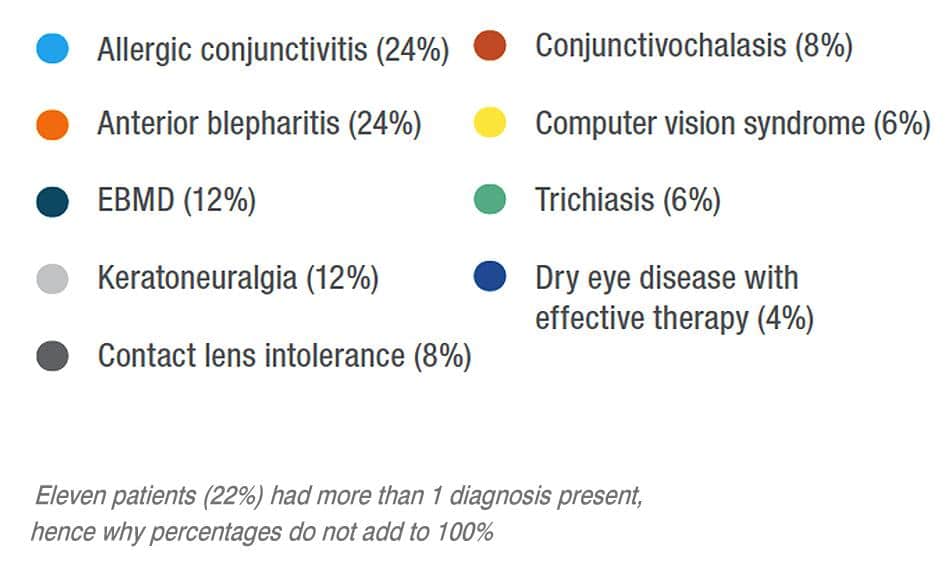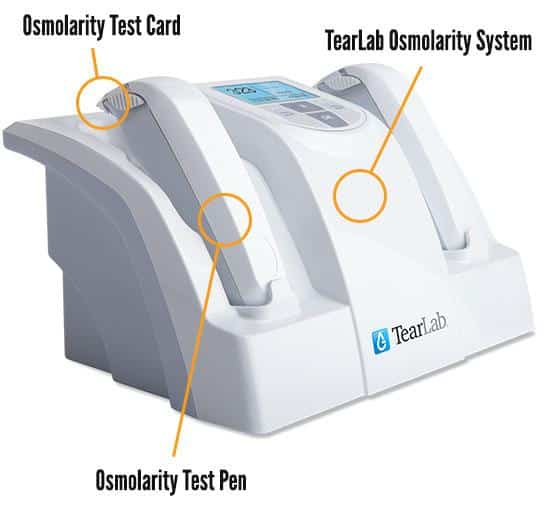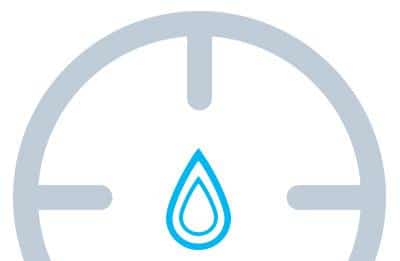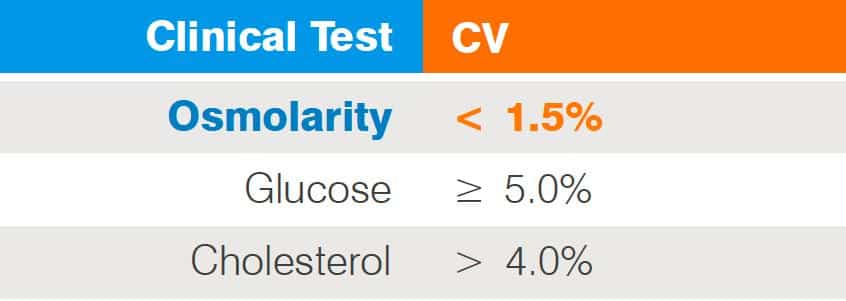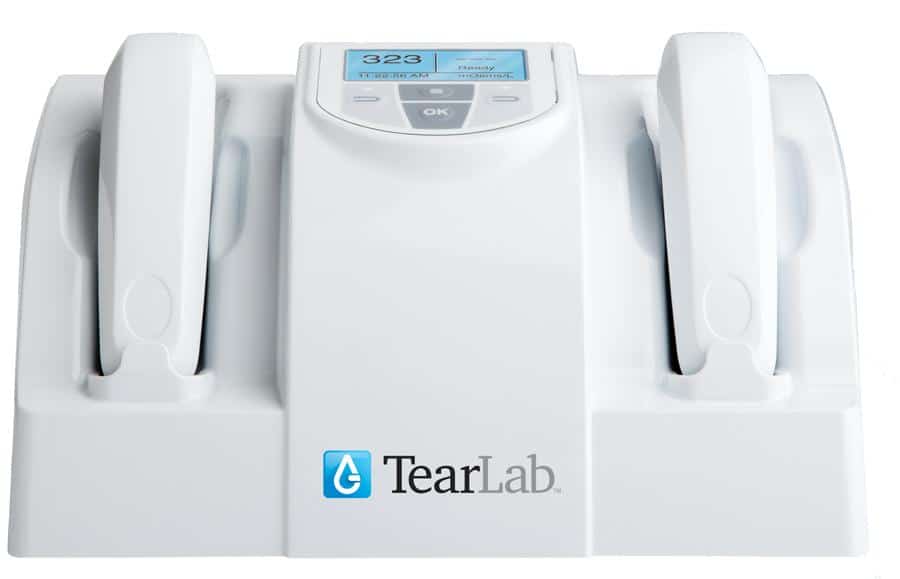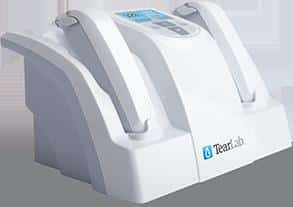Dry Eye
What Are dry eyes?
Dry eye is a common condition that occurs when the eyes are insufficiently moisturized, leading to itching, redness and pain from dry spots on the surface of the eye. The eyes may become dry and irritated because the tear ducts don’t produce enough tears, or because of a chemical imbalance in the tears.
Patients with this condition often experience irritating symptoms and which may result in more serious damage to the vision if the condition is left untreated. It is important for patients with this condition to take special care of their eyes in order to alleviate symptoms and prevent complications. Your doctor can diagnose dry eye after a thorough evaluation of your eyes and tear production with a Schirmer tear test as well as testing a concept called TEAR OSMOLARITY.
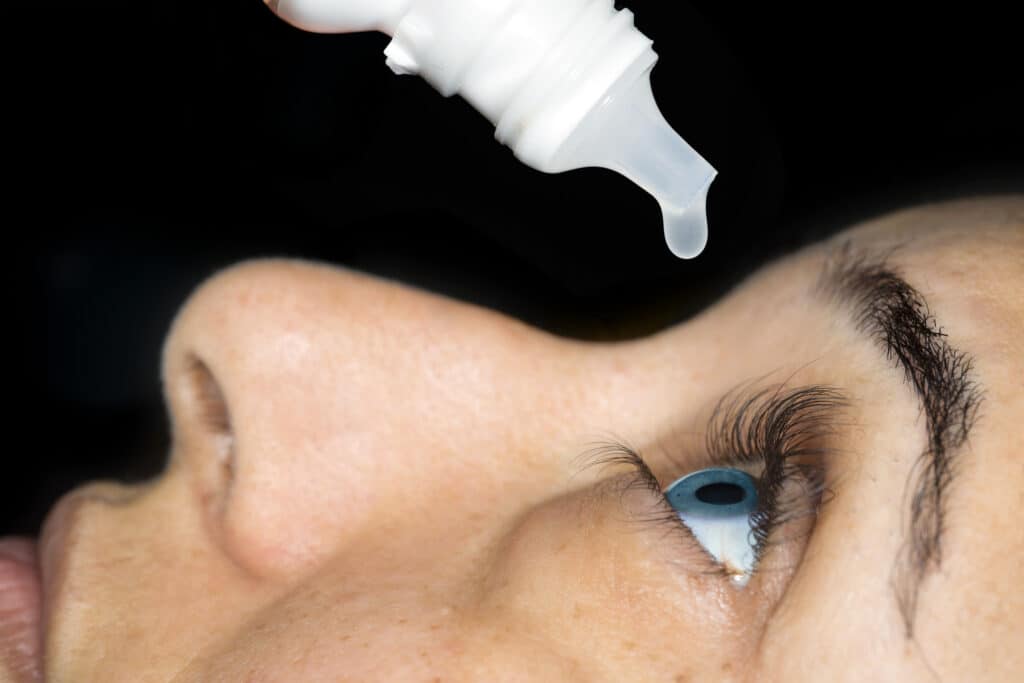
CAUSES OF DRY EYE
People usually begin experiencing dry eye symptoms as they age, but the condition can also result from certain medications, conditions or injuries. Dry eye tends to affect women more often than men, due to the hormonal changes that take place during pregnancy or menopause. Oral contraceptives can also affect the consistency of tears. Dry eye is more common in people over the age of 50. Other causes of dry eye may include:
- Aging
- Medication such as antihistamines, decongestants, blood pressure medication and antidepressants
- Medical conditions such as rheumatoid arthritis, diabetes and thyroid problems
- Environmental conditions such as smoke, wind, air conditioning and dry climates
- Long-term contact lens use
- Eye surgery
- Sun exposure
- Smoking or second-hand exposure to smoke exposure
- Thyroid eye disease
- An eye injury
- Eyelid surgery
- Inflammation of the conjunctiva
- Exposure keratitis
These factors can affect the frequency or consistency of tears, both of which can lead to dry eyes. Our natural tears require a certain chemical balance in order to efficiently moisturize the eyes.
SYMPTOMS OF DRY EYE
Patients with dry eye may experience certain symptoms from this condition, usually affecting both eyes, which may include:
- Stinging or burning sensation
- Irritation from smoke or wind
- Eyes that feel scratchy
- Eye fatigue
- Sensitivity to light
- Difficulty wearing contact lenses
- Excessive tearing
- Blurry vision
Dry eye can damage the eye’s tissues leaving tiny abrasions on the surface of your eyes, impairing vision. Fortunately, many treatment options are available to help relieve the symptoms of dry eyes, restoring health back to the eyes ensuring clear vision and long-term health.
COMPLICATIONS OF DRY EYE
Left untreated, dry eye can lead to the following complications:
- Pain
- Ulcers or scars on the cornea
- Loss of vision
TREATMENT OF DRY EYE
Treatment for dry eye depends on the cause and severity of the condition, as well as the patient’s overall health and personal preference. Non-surgical treatments are often effective, and may include the following:
- Blinking on purpose
- Increasing humidity levels at home or work
- Use artificial tears or a moisturizing ointment. Only medical eye drop is Restasis®.
- Stop smoking or exposure to second-hand smoke
- Avoiding air conditioning or windy conditions outdoors
- Stop the use of allergy and cold medicines
- Adding omega-3 fatty acids to the diet as food or supplements
If non-surgical methods are unsuccessful, surgical treatments may be an option. Treatment options may include:
- Small punctal plugs may be inserted in the corners of the eyes to limit tear drainage
- Punctal cautery, a procedure to permanently close the drainage holes may be another option
- Eyelid surgery is also a solution if an eyelid condition is causing your dry eyes
Treating the underlying cause of dry eyes can also help relieve the symptoms of this condition.
Regener-Eyes is a powerful biologic new eye drop for the treatment of uncomfortable, dry, irritated eyes. Invented in recent years, regener-eyes is often used in a condition commonly referred to as meibomian gland dysfunction redness, a sensation in your eye and sometimes pain. This drop was invented by a pioneer in conditions of the eye named randal harol. A simple google search will produce many articles in note publications about the effectiveness of regener-eyes. The eye drop works as an anti-inflammatory and immunomodulatory medicine. It contains cytokines, growth factors , and chemokines which help treat corneas and dry eye disease.
Your eye care specialist will prescribe Regener-Eyes when appropriate. Our office carries this restorative medicine, for your convenience. This is a first class, natural, biologic ophthalmic solution truly ground break treatment tool for dry gritted irritated eyes.

Your eye doctor will prescribe Cequa as part of a comprehensive dry eyes disease rejamine, typically taken twice a day in each eye, and is indicated as the treatment of chronic dry eye disease and membiomine gland definition. Cequa available at your local pharmacy, with coupons available.
The amniotic membrane, when used in the eye, is a unique collagenous tissue derived from the innermost submucosa of the placenta. The innate properties of amniotic membrane make it ideal for wound healing and, in eye care, the management of corneal and conjunctival disease. Amniotic membrane has been shown to have both anti-inflammatory and anti-microbial properties while acting as a natural scaffold that expedites re-epithelialization, (healing).
Amniotic membranes are used to treat corneal erosions, corneal abrasions, foreign body removal, elementary and post-infectious keratitis, corneal ulcer, chemical and thermal burns, superficial keratectomy, PRK haze, neurotrophic corneal epithelial defects, dry eye, exposure keratopathy, Salzmann’s nodular degeneration, shield ulcers, etc.
Dr. Magalhaes is the one and only doctor in the area using this FDA approved treatment. Dr. Magalhaes and Associates will determine if you are a candidate amniotic membrane.
Tear lab
Tear lab is an essential diagnostic test for Dry eye Syndrome. Patients with dry eye complain bitterly of grittiness, a sensation of something in the eyes, dryness, and poor vision. We are fortunate to showcase this impressive technology in our practice to help in the diagnosis and treatment of dry eye.
Tear lab is an objective and quantitative point-of-care diagnostic test that provides precise and predictive information.
The TearLab Osmolarity System* is intended to measure the osmolarity, or salt content of human tears to aid in the diagnosis of dry eye disease in patients suspected of having dry eye disease, in conjunction with other methods of clinical evaluation.
Osmolarity: What the numbers reveal
- Tear osmolarity is informative when the results are abnormal or normal.
- Abnormal Osmolarity is defined by:
An elevated reading, >300 mOsm/L, indicating loss of homeostasis.
OR, When the inter-eye difference is >8 mOsm/L, indicating instability of the tear film.
Osmolarity is an important biomarker of ocular surface health
A symptomatic patient with normal tear osmolarity may not have dry eye.
In a prospective observational study of 50 symptomatic patients with normal tear osmolarity, the most frequent diagnoses included:
How it works
The TearLab Osmolarity Test Card, in conjunction with the TearLab Osmolarity System , provides a quick and simple method for determining tear osmolarity using nanoliter (nL) volumes of tear fluid collected directly from the eyelid margin. The Test Card is held by the Osmolarity Test Pen, for safe collection.
The TearLab Osmolarity Test utilizes a temperature-corrected impedance measurement to provide an indirect assessment of osmolarity. After applying a lot-specific calibration curve, osmolarity is calculated and displayed as a quantitative numerical value.
To learn how to perform the test, see our Training Videos.
How to perform the testPatient information
Precise and predictive results at the point-of-care
PRECISE:
More precise than other universally accepted point-of-care tests such as cholesterol and glucose.
THE SCIENCE
TearLab is predictive
TearLab has a positive predictive value of 89%.
Positive predictive value is the probability that subjects with a positive test truly have the disease.
Please contact the office for a dry eye evaluation and to determine if TEAR Lab can help you.
Patient Testimonial
“Professional eye doctor who listens to what you need and find the best way to measure the degrees for your glasses. The front desk ladies are very cooperative with timely manner. Techniques are friendly to find the accurate insurance coverage for you.”
How Can I prevent Dry Eyes in the future?
There are certain steps patients can take to prevent the symptoms of dry eye from occurring, which is especially useful for those at an increased risk of developing symptoms. Simple lifestyle modifications such as wearing protective glasses on windy days, giving your eyes a break during reading or other strenuous tasks can effectively reduce the frequency and severity of symptoms.
Your doctor will provide you with instructions as to how you can avoid the symptoms of dry eye based on your individual condition.





